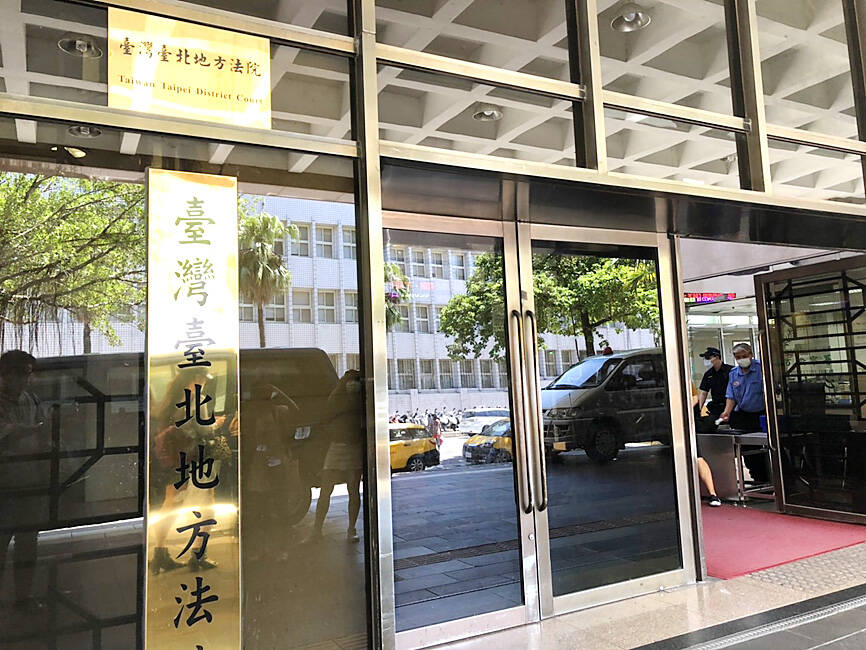The Taipei District Court on Friday ruled that a child at the center of a custody battle between an Italian father and a Taiwanese mother should spend part of her school vacations in Italy with her father.
The court said that to strengthen the child’s “direct and personal relations with her father and [paternal] relatives,” she should spend 10 and 30 days respectively of her winter and summer vacations in Italy.
The legal battle started in 2017, when the father took the girl — who at the time lived with her mother, surnamed Chan (詹), in Taiwan — to Italy to visit his family, where she remained against the will of her mother.

Photo: Wang Meng-lun, Taipei Times
Chan later traveled to Italy and brought her daughter back, which the father described as abduction.
He subsequently traveled to Taiwan to fight for legal custody of the child.
The girl was born in 2014, but the parents were never married.
In January, the court ruled that the father had sole parental rights and ordered Chan to return the child to her father by March 14. Chan lodged an appeal in February, but the Supreme Court upheld the lower court’s decision.
The case garnered media attention after the girl wrote a widely publicized letter to President Tsai Ing-wen (蔡英文), in which she said she wished to stay in Taiwan.
After the girl refused to be taken by judicial officers from her school on March 14, Chan appealed to the Constitutional Court later that month, requesting a stay of execution, which was granted.
After hearing the case, the Constitutional Court in May found that the Supreme Court’s ruling had contravened the Constitution’s intent to protect the personal rights and dignity of minors.
It returned the case to the Supreme Court, which in October invalidated its initial ruling and sent the case back to the Taipei District Court.
In its ruling on Friday, the district court acknowledged the girl had not expressed a desire to spend vacations with her father in her testimony.
However, based on the child’s “contradictory” statements — such as that she missed her father, but did not want to see him — the court concluded that she was “facing a loyalty dilemma” in the conflict between her parents and that her words “did not necessarily reflect her actual feelings.”
The court also admonished the parents, saying their “mutual mistrust” had caused the child to “lose out on the linguistic and cultural advantages of dual citizenship,” and subjected her to emotionally traumatic experiences.
The intent of the verdict is to “rebuild a cooperative coparenting relationship” and restore to the child the benefits of dual citizenship, the court said, adding that it had referred the parents and girl to counseling services to help facilitate the process.

A preclearance service to facilitate entry for people traveling to select airports in Japan would be available from Thursday next week to Feb. 25 at Taiwan Taoyuan International Airport, Taoyuan International Airport Corp (TIAC) said on Tuesday. The service was first made available to Taiwanese travelers throughout the winter vacation of 2024 and during the Lunar New Year holiday. In addition to flights to the Japanese cities of Hakodate, Asahikawa, Akita, Sendai, Niigata, Okayama, Takamatsu, Kumamoto and Kagoshima, the service would be available to travelers to Kobe and Oita. The service can be accessed by passengers of 15 flight routes operated by

Chinese spouse and influencer Guan Guan’s (關關) residency permit has been revoked for repeatedly posting pro-China videos that threaten national security, the National Immigration Agency confirmed today. Guan Guan has said many controversial statements in her videos posted to Douyin (抖音), including “the red flag will soon be painted all over Taiwan” and “Taiwan is an inseparable part of China,” and expressing hope for expedited reunification. The agency last year received multiple reports alleging that Guan Guan had advocated for armed reunification. After verifying the reports, the agency last month issued a notice requiring her to appear and explain her actions. Guan

GIVE AND TAKE: Blood demand continues to rise each year, while fewer young donors are available due to the nation’s falling birthrate, a doctor said Blood donors can redeem points earned from donations to obtain limited edition Formosan black bear travel mugs, the Kaohsiung Blood Center said yesterday, as it announced a goal of stocking 20,000 units of blood prior to the Lunar New Year. The last month of the lunar year is National Blood Donation Month, when local centers seek to stockpile blood for use during the Lunar New Year holiday. The blood demand in southern Taiwan — including Tainan and Kaohsiung, as well as Chiayi, Pingtung, Penghu and Taitung counties — is about 2,000 units per day, the center said. The donation campaign aims to boost

The Central Weather Administration (CWA) said a magnitude 4.9 earthquake that struck off the coast of eastern Taiwan yesterday was an independent event and part of a stress-adjustment process. The earthquake occurred at 4:47pm, with its epicenter at sea about 45.4km south of Yilan County Hall at a depth of 5.9km, the CWA said. The quake's intensity, which gauges the actual effects of a temblor, was highest in several townships in Yilan and neighboring Hualien County, where it measured 4 on Taiwan's seven-tier intensity scale, the CWA said. Lin Po-yu (林柏佑), a division chief at the CWA's Seismological Center, told a news conference